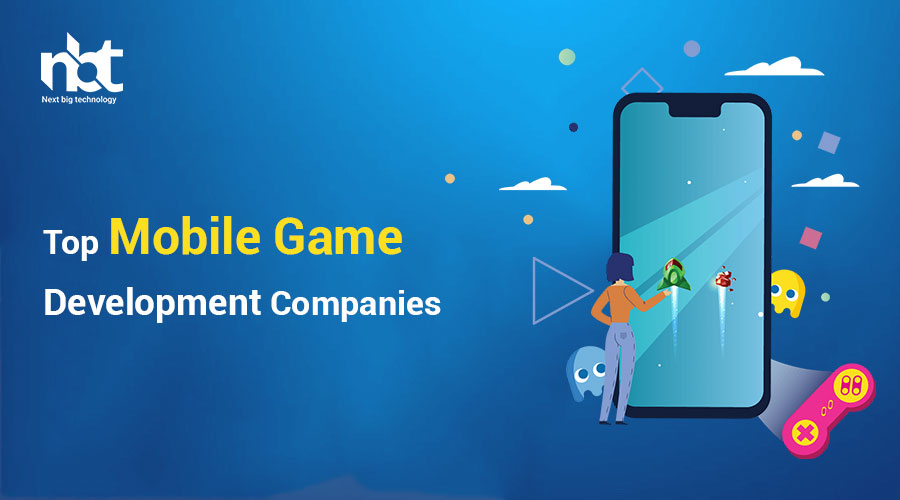In the dynamic world of mobile gaming, mobile game development continues to thrive with its engaging experiences and widespread appeal. For businesses looking to enter or expand in the mobile gaming industry, partnering with a top-tier mobile game development company is crucial. Here’s a curated list of some of the leading mobile game development companies that have consistently delivered exceptional results in 2024.
Table of Contents
1. Next Big Technology:

Next Big Technology is the leading mobile app and web development company in India. They offer high-quality outcomes of every project according to the requirement of the client. They are having an excellent in-house team of skilled and experienced developers. They provide timely project delivery as per given deadline and always deliver client oriented and requirement specific project.
Next Big Technology is one of the top development companies for the high-quality development of mobile app and web development services. They are having experienced in-house team of developers who provide top notch development services according to the business requirements. NBT provide highly business-oriented services and implement all the latest and trending tools and technologies. They always work hard to deliver a top-notch solution at an affordable cost. They are having experience of more than 13 years and delivered lots of projects around the globe to the business and clients.
NBT is highly focused on providing top notch development solutions in a very affordable cost. By using their market experience and development experience, they are delivering proper solution to clients and various industries for their custom requirements.
Location: India, USA, UK, Australia
Hourly Rate :< $25 per Hour
Employees: 50 – 249
Focus Area
- Mobile App Development
- App Designing (UI/UX)
- Software Development
- Web Development
- AR & VR Development
- Big Data & BI
- Cloud Computing Services
- DevOps
- E-commerce Development
Industries Focus
- Art, Entertainment & Music
- Automotive Software
- Business Services
- Banking Software
- Consumer Products
- Designing
- Education
- Financial & Payments
- Gaming
- Government
- Healthcare & Medical
- Hospitality
- Information Technology
- Legal & Compliance
- Manufacturing
- Media
2.Supercell
-
- Location: Helsinki, Finland
- Overview: Supercell is renowned for creating addictive and highly engaging mobile games such as Clash of Clans and Brawl Stars. They focus on delivering games with compelling gameplay and community interaction, setting benchmarks in the mobile gaming industry.
- Notable Projects: Clash of Clans, Brawl Stars, Clash Royale
3.Rovio Entertainment
-
- Location: Espoo, Finland
- Overview: Rovio Entertainment is best known for developing the iconic Angry Birds franchise, which has become a global phenomenon in mobile gaming. They continue to innovate with new game concepts and maintain a strong presence in the market.
- Notable Projects: Angry Birds series, Bad Piggies, Angry Birds Evolution
4.Epic Games
-
- Location: Cary, North Carolina, USA
- Overview: Epic Games is a powerhouse in the gaming industry, known for developing Fortnite, one of the most popular battle royale games worldwide. They emphasize cutting-edge graphics and gameplay mechanics in their mobile game offerings.
- Notable Projects: Fortnite, Infinity Blade series, Battle Breakers
5.King
-
- Location: London, United Kingdom
- Overview: King is celebrated for creating casual puzzle games, with Candy Crush Saga being their flagship title. They specialize in games that are easy to pick up yet challenging to master, catering to a broad audience of mobile gamers.
- Notable Projects: Candy Crush Saga, Candy Crush Soda Saga, Farm Heroes Saga
6.Gameloft
-
- Location: Paris, France
- Overview: Gameloft is a leading developer and publisher of mobile games across various genres, including action, racing, and simulation. They focus on delivering high-quality gaming experiences with rich graphics and immersive gameplay.
- Notable Projects: Asphalt series, Modern Combat series, Dungeon Hunter series
7.Netmarble
-
- Location: Seoul, South Korea
- Overview: Netmarble is a global gaming company known for developing and publishing a diverse range of mobile games. They have a strong presence in both casual and hardcore gaming markets, with titles that resonate globally.
- Notable Projects: Lineage 2: Revolution, MARVEL Future Fight, Seven Knights
8.Ubisoft Mobile
-
- Location: Montreuil, France
- Overview: Ubisoft Mobile is the mobile division of Ubisoft, a renowned developer and publisher in the video game industry. They bring their expertise in AAA gaming to mobile platforms, offering high-quality experiences for gamers worldwide.
- Notable Projects: Assassin’s Creed Rebellion, Hungry Shark Evolution, Rayman Adventures
9.Niantic
-
- Location: San Francisco, California, USA
- Overview: Niantic is known for pioneering augmented reality (AR) mobile gaming with Pokémon GO, a global sensation that integrates real-world exploration with gaming. They continue to innovate in AR and location-based gaming.
- Notable Projects: Pokémon GO, Ingress, Harry Potter: Wizards Unite
10.Bandai Namco Entertainment
-
- Location: Tokyo, Japan
- Overview: Bandai Namco Entertainment is a major player in the gaming industry, known for developing and publishing a wide range of mobile games based on popular franchises and original IPs. They focus on delivering engaging experiences across different genres.
- Notable Projects: PAC-MAN, Dragon Ball Legends, Tales of Crestoria










